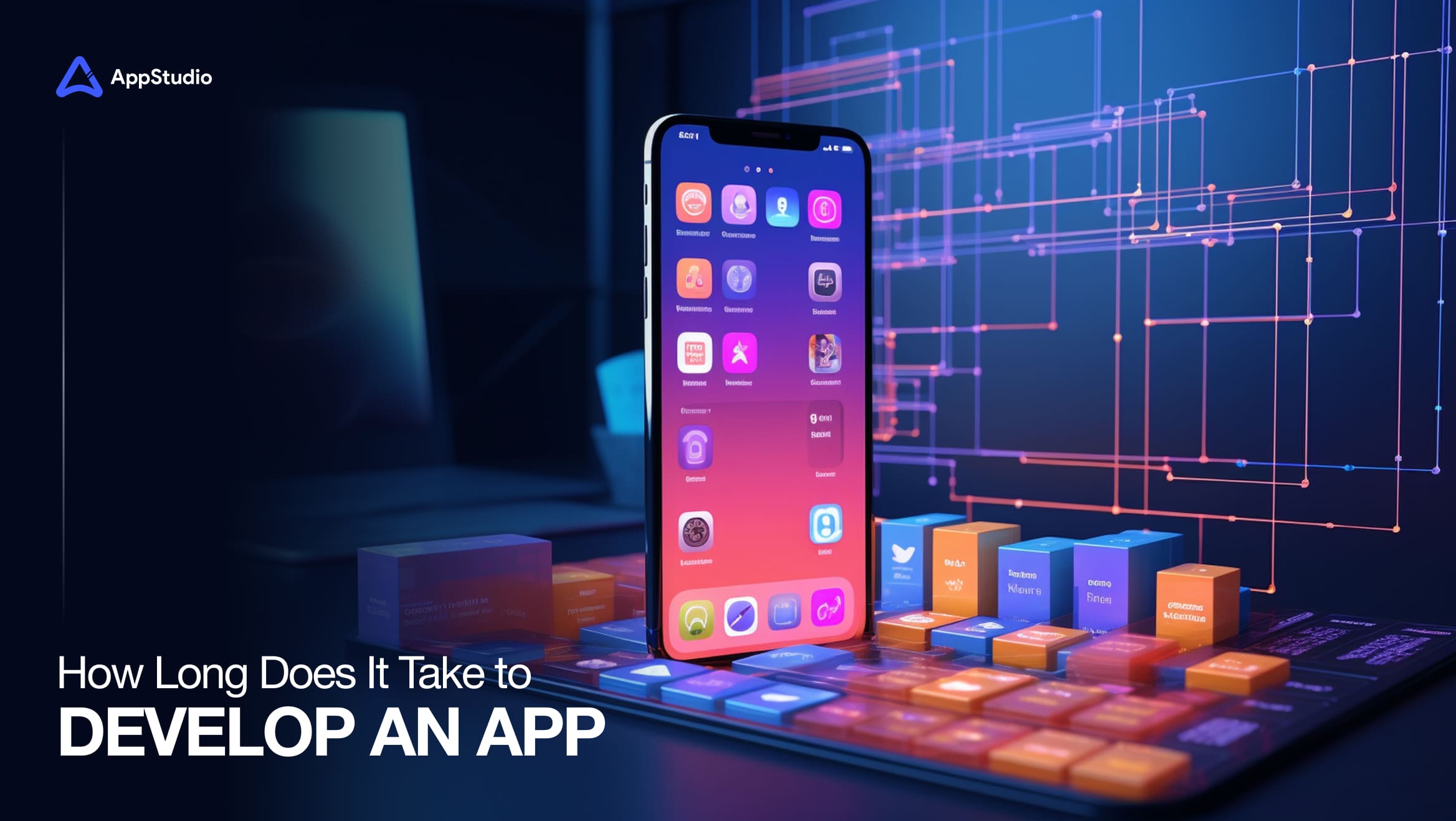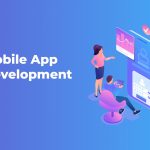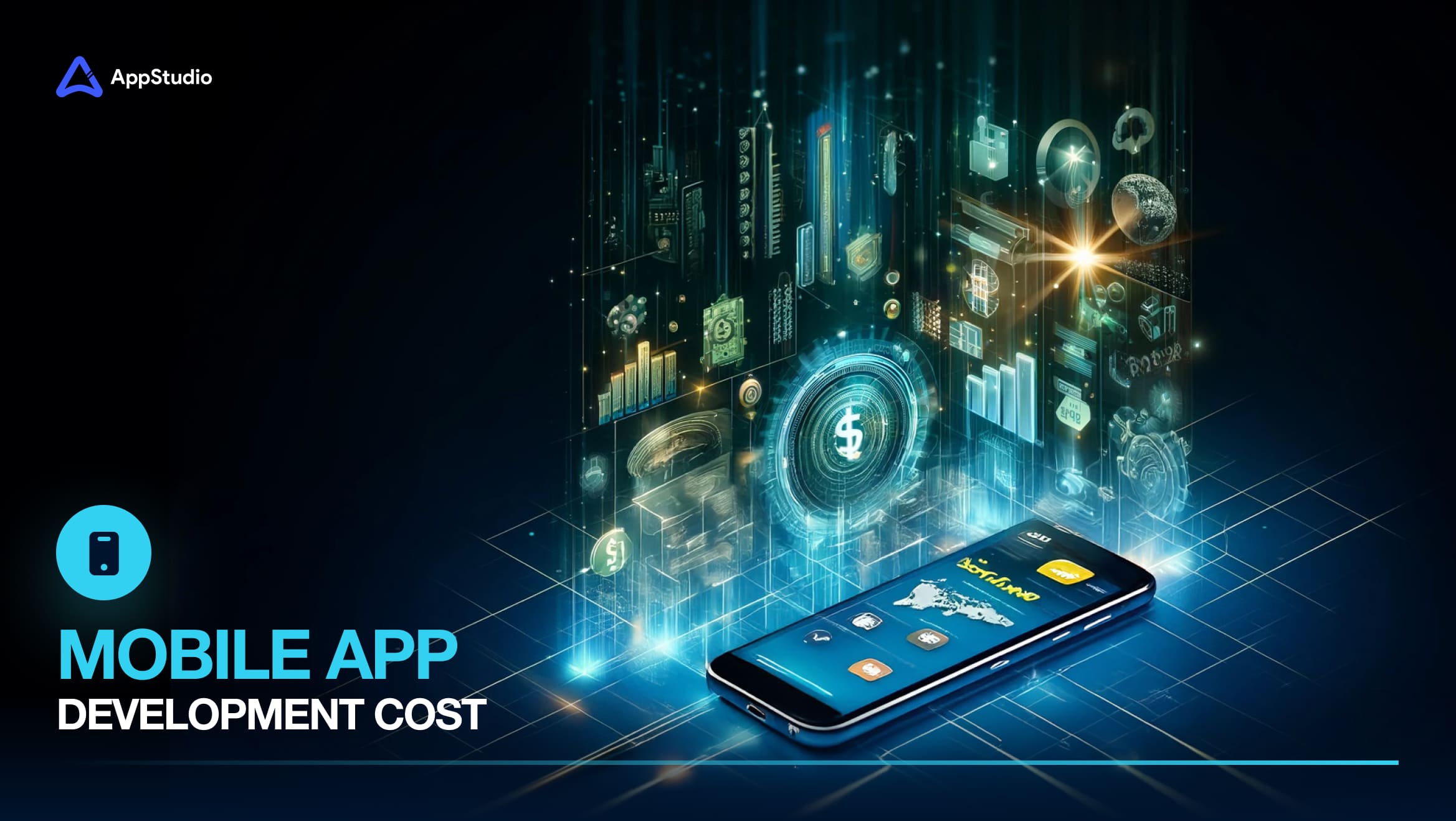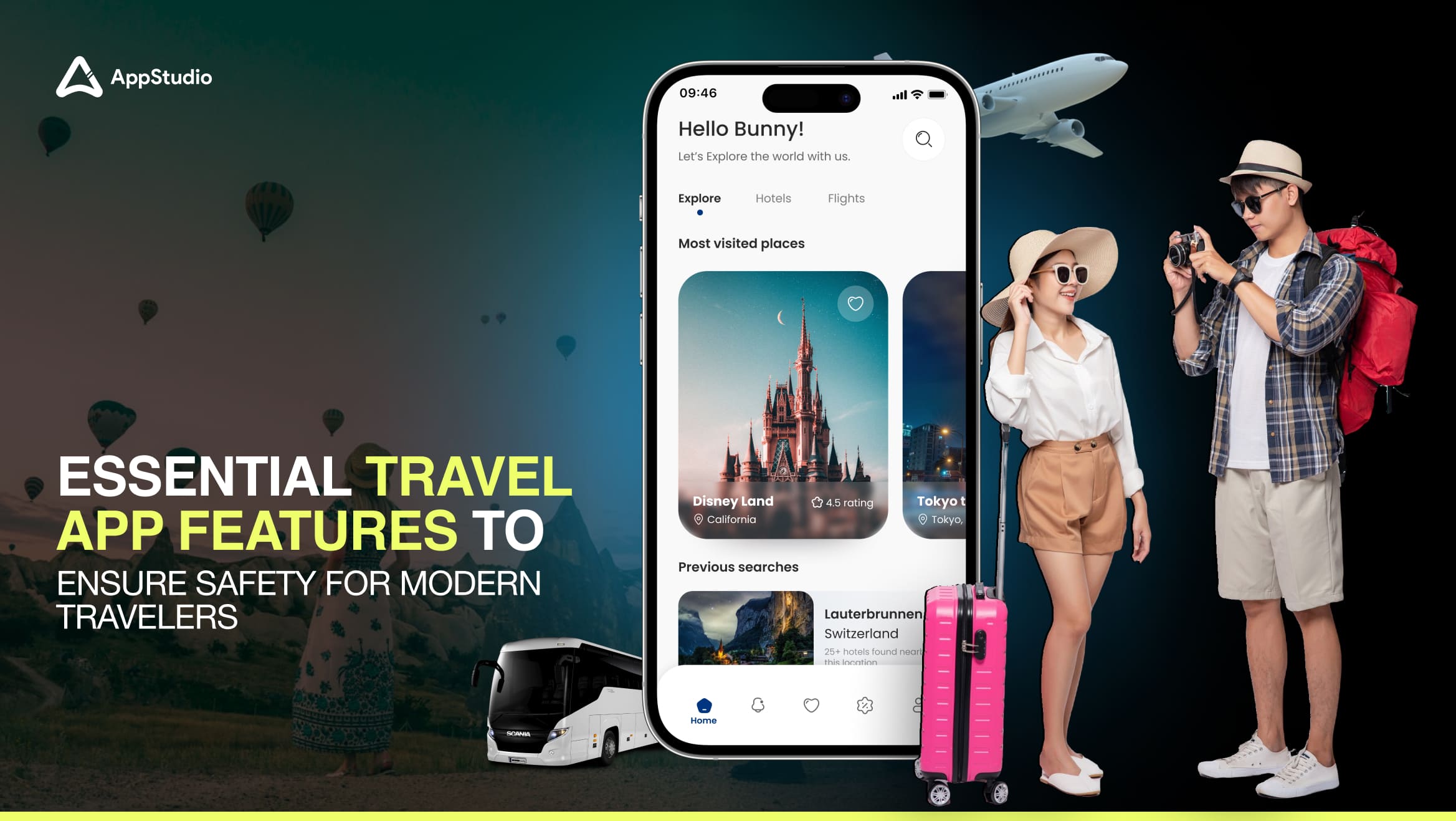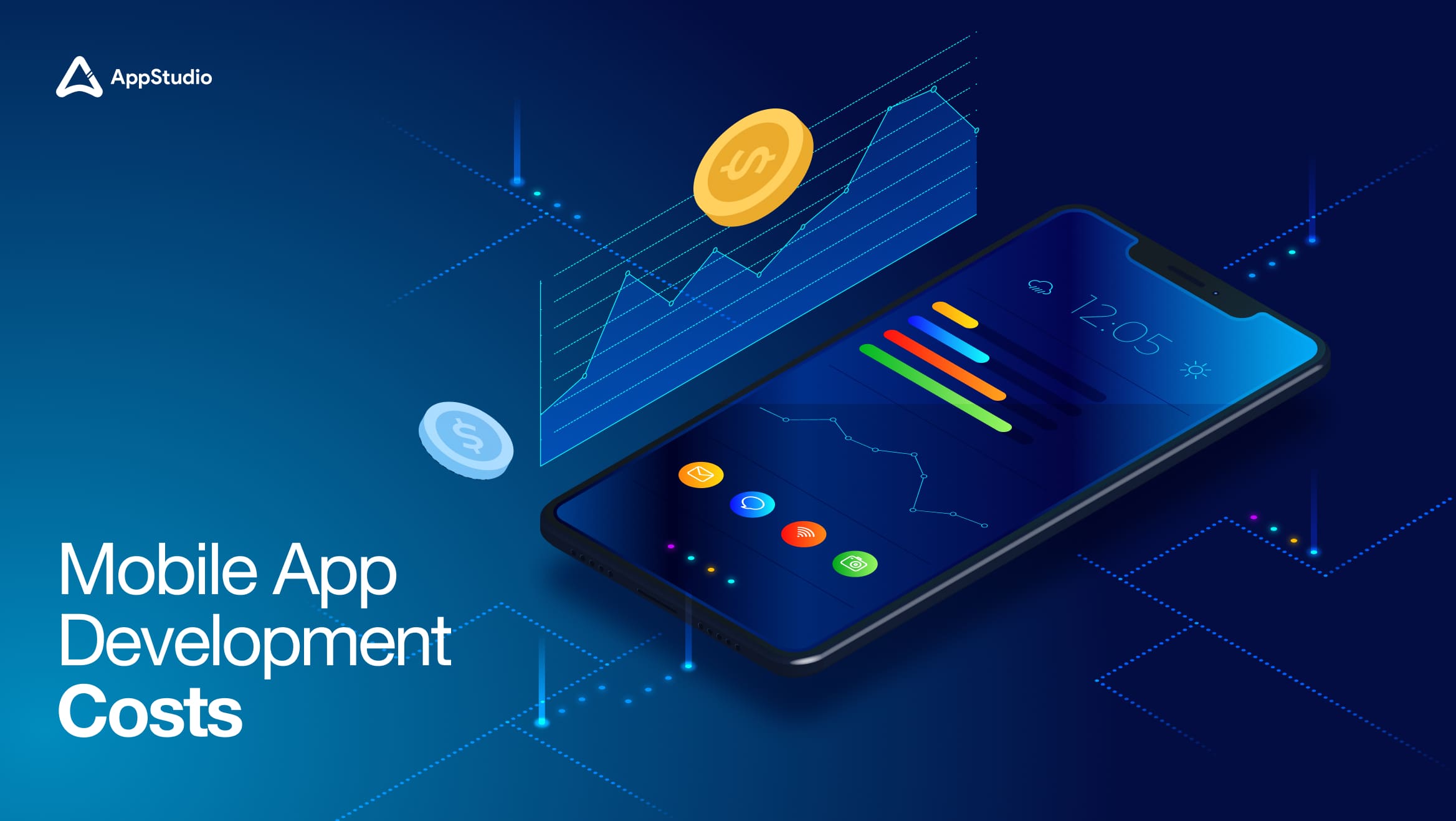The common phrase “Time is money” is particularly relevant in mobile app development, where various factors influence the duration and cost of creating an app. A clear understanding of your budget and the scope of your project is essential, as these factors determine the required resources and help establish a realistic timeline for completion. This foundational knowledge is crucial, and unsurprisingly, one of the most frequent inquiries from our clients is about the potential cost of developing their mobile app and the average time to develop an app.
Mobile apps are crucial for businesses seeking effective customer engagement in today’s rapidly expanding digital marketplace. Business of Apps reports that there are currently approximately 3.3 million Android apps on Google Play and about 2.2 million iOS apps on the App Store. The app market is rapidly growing, with financial projections indicating substantial increases. According to Statista, the total revenue from mobile apps is expected to grow at an annual rate of 8.83%, potentially reaching a market volume of $673.80 billion by 2027.
Another pressing question from businesses concerns how long it takes to develop an app. The average development time for an app varies depending on the app’s complexity. For instance, a straightforward utility app will generally require less development time than a complex social networking app that needs extensive backend development and advanced features. To provide more clarity, the app development process can be segmented into several phases—ideation, planning, design, development, testing, and deployment—each with its own expected duration. This breakdown helps businesses gain a clearer understanding of their project timelines.
Through our extensive experience, we’ve found that having a clear grasp of the costs and timelines associated with app development is crucial for clients to confidently begin their projects. This guide aims to address major concerns regarding how quickly the app development process can be completed and when the finished product will be ready for launch. We cover everything from the initial consultations that shape your app’s concept and goals to the final stages of refinement and public release.
By the end of this guide, you will have a comprehensive understanding of what’s involved in developing a mobile app, the average time to develop an app, and how these timelines correlate with costs. This information will prepare you for the development journey, providing clarity on the process and setting realistic expectations.
Let’s explore the average development time for an app and prepare for the successful launch of your project.
Related reading: What Are the Challenges in Mobile App Development
The Timeline for Creating a Mobile App
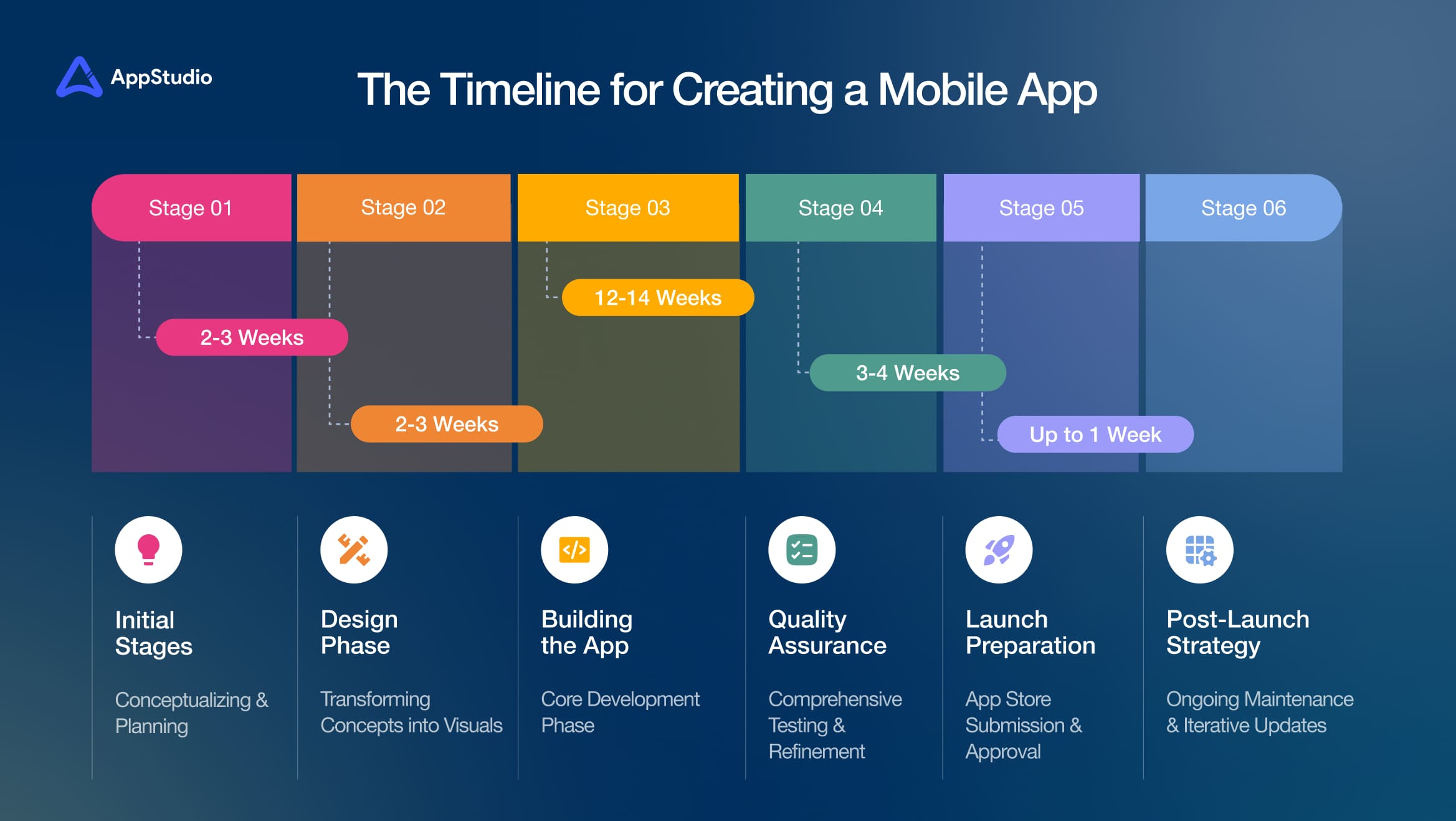
Creating a mobile app is a dynamic process that varies greatly with each project due to unique functionalities, design complexities, and varying scopes. To understand how long does it takes to develop an app, one must first grasp that each step in the development process can impact the timeline and budget significantly. In this detailed guide, we’ll explore the various stages of mobile app development, offer insights into the common durations for each phase, and discuss factors that could influence the overall timeline.
Initial Stages: Conceptualizing and Planning (2-3 Weeks)
The journey to developing a mobile app begins with a solid planning phase. This stage is critical as it lays the foundation for the entire project. Planning involves defining the scope, setting clear objectives, and understanding the target user base. This phase typically lasts 2 to 3 weeks and includes several key activities:
- Conceptualization: Here, you articulate your app idea and start to flesh out the necessary features and functionalities. This is also where you decide whether the app will be native to specific platforms like iOS or Android or if a cross-platform development approach is more suitable.
- Market Research: Understanding the market landscape is crucial. This involves analyzing competitors, identifying target audience segments, and understanding user needs. This research ensures that the app will be both viable in the marketplace and appealing to users.
- Creating a Detailed Brief: The brief contains everything developers need to know about what you envision for your app. It covers the type of app, its primary functions, the intended user base, and specific requests concerning the app’s design and operational functionalities.
Design Phase: Transforming Concepts into Visuals (2-3 Weeks)
After planning, the next phase is designing the app. This stage transforms the conceptual elements from the brief into visual and interactive elements. The design phase generally takes 2 to 3 weeks, depending on the app’s complexity. It involves:
- Wireframing: Early in the design phase, wireframes are created to outline the app’s structural layout. These are basic blueprints that map out the user interface (UI) and core functionalities.
- Prototyping: More detailed than wireframes, prototypes are interactive demos of the app. They give stakeholders a better understanding of the flow and feel of the app before full-scale development begins.
- Design Finalization: This step involves finalizing the app’s design elements, including the color scheme, typography, and user interface elements such as buttons and icons.
Building the App: Core Development Phase (12-14 Weeks)
Development is where the app is built. It is typically the longest phase in the mobile app development process, ranging from 12 to 14 weeks. It’s divided into two key areas:
- Backend Development: The backend is essentially the server side of the app, dealing with database management, user authentication, server-side logic, and data integration. This is where developers set up the servers and databases and ensure data flows seamlessly between the app and its backend infrastructure.
- Frontend Development: The frontend development is the part of the app users interact with. During this phase, developers build and connect the interface elements to the backend. This stage ensures the app is responsive and performs well across different devices and platforms.
Quality Assurance: Comprehensive Testing and Refinement (3-4 Weeks)
Testing is essential to ensure the final product is free from bugs and meets quality standards. This phase usually lasts between 3 to 4 weeks and involves multiple types of tests:
- Unit Testing: Developers test individual components of the app to ensure each part functions correctly in isolation.
- Integration Testing: Different parts of the app are tested together to ensure they work well in unison.
- Performance Testing: This tests how well the app performs under various load conditions.
- Security Testing: Ensuring that the app is secure and that data privacy regulations are adhered to is critical.
- User Acceptance Testing (UAT): This final testing phase involves real users testing the app in a controlled environment to provide feedback on its functionality and user experience.
Launch Preparation: App Store Submission and Approval (Up to 1 Week)
Once testing is complete, the app is ready for deployment. This final stage involves submitting the app to app stores like Google Play and the App Store. Each store has its own set of guidelines and review processes. Deployment can take up to a week, during which the app is reviewed for compliance with store guidelines before it goes live.
Post-Launch Strategy: Ongoing Maintenance and Iterative Updates
After launch, the app will require ongoing maintenance and updates to ensure it remains relevant and functional as operating systems and user expectations evolve. Regular updates based on user feedback and analytics are crucial for long-term success.
In short, how much time to develop an app can vary widely, influenced by the app’s complexity, the professionalism of the development team, and external factors such as feedback loops and approval times. Understanding mobile app development time in detail helps in planning for a smooth development process and a successful app launch.
Related reading: Cost of Developing A Social Media App Like Threads
Comparative Timelines for App Development Types
Here, we’ve outlined some industries and the time typically needed to develop an app for each. Keep in mind, there’s no universal fit. If your business doesn’t match any of the industries listed below, reach out to Appstudio for a precise development timeline tailored to your needs.
Healthcare App Development: Comprehensive Care Through Technology
Healthcare apps are transforming how we manage our health by facilitating seamless interaction with healthcare services and personal health data. Popular apps like MyFitnessPal, Happify, SleepCycle Alarm Clock, and Medisafe are at the forefront of this revolution.
How long does it take to develop an app in healthcare? Typically, development can span from 6 to 9 months. This timeframe accounts for the complexities of integrating advanced healthcare technologies and the stringent regulatory requirements such as HIPAA compliance. Essential features of healthcare apps may include:
- Real-time Heart Rate Monitoring: Enabling users to monitor their heart rate continuously through the app for better heart health management.
- Electronic Health Records (EHR) Integration: Facilitating easy access to patient records to ensure informed healthcare decisions.
- HIPAA Compliance: Ensuring all patient data is handled in accordance with HIPAA standards to protect patient privacy.
- Telemedicine Features: Allowing consultations and medical advice via remote communication to increase healthcare accessibility.
- Goal Setting and Tracking: Helping users set health-related goals and monitor their progress, enhancing motivation and engagement.
- Daily Health Tips and Built-in Messaging: Offering daily personalized health tips and a communication platform for healthcare providers and users.
Educational App Development: Enriching Learning Experiences
The rise of digital education platforms has significantly altered traditional learning paradigms. Apps like Khan Academy, Duolingo, SoloLearn, edX, and Google Classroom are leading the way in this sector.
The average development time for an education app typically ranges from 4 to 8 months. This period allows developers to implement a range of educational tools and interactive features designed to enhance the learning experience. Common functionalities include:
- Screen Sharing and Session Recording: Enabling live sharing of educational content and recording lessons for later review.
- In-session Chats and Polls: Facilitating real-time communication and interactive polls during lessons to increase student engagement.
- Streaming and File Sharing: Allowing educators to stream educational videos and share learning materials directly within the app.
- Administrative Controls for Chat: Giving educators the ability to manage chat interactions to maintain a conducive learning environment.
- Breakout Rooms: Offering the functionality to create smaller groups within the main virtual classroom for targeted discussions or activities.
Food Delivery App Development: Streamlining Meal Ordering and Delivery
The food delivery sector has seen exponential growth, especially post-pandemic, with apps like UberEats, Deliveroo, DoorDash, Seamless, and GrubHub revolutionizing how we order food.
How long does it take to develop an app for food delivery? The development timeframe generally lasts 4 to 6 months, depending on the app’s complexity and the required features. Key features often integrated into food delivery apps include:
- Map and Route Integration: Enabling efficient route planning for delivery personnel to reduce delivery times.
- Real-time Order and Delivery Tracking: Allowing customers to track their order status and delivery progress in real-time.
- Push Notifications: Sending timely alerts and notifications to keep users updated on their order status and promotional offers.
- Social Media Integration: Facilitating easy sharing of favorite dishes and delivery experiences on social media platforms.
- Advanced Filtering Options: Helping users filter restaurants and cuisines to quickly find their preferred options.
- Delivery Tips Feature: Providing customers with the option to tip their delivery personnel directly through the app.
Each type of app development project demands a tailored approach to ensure functionality and user satisfaction, impacting the mobile app development time. Developers and clients can better plan and execute successful app launches by understanding these timelines and features.
Related reading: What are The Primary Steps in Developing A Mobile Application?
4 Important Factors Influencing App Development Duration
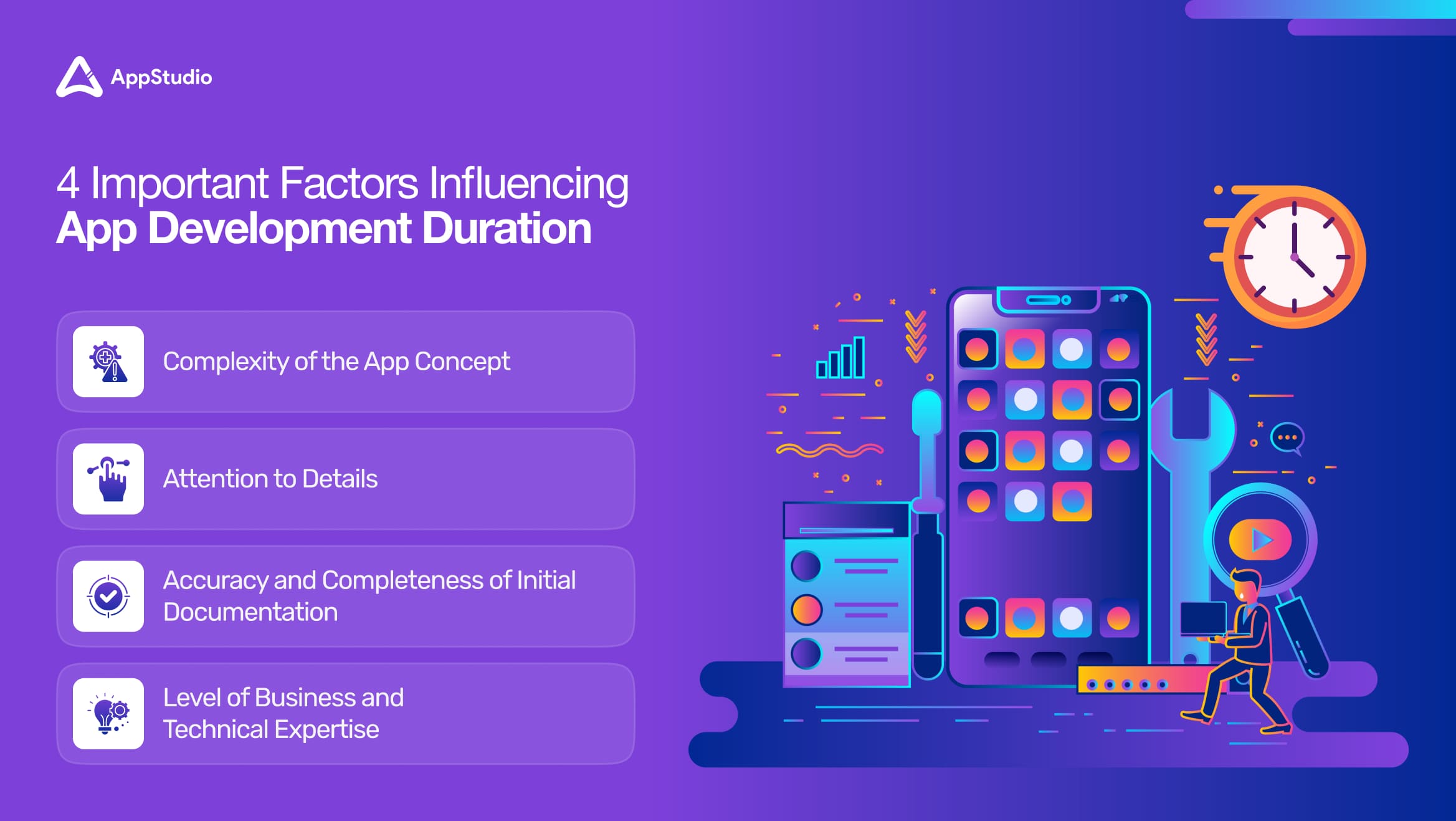
Several critical factors can significantly impact the timeline for bringing an app from concept to launch in the dynamic field of app development. Understanding these elements can help set realistic expectations and plan more effectively.
Complexity of the App Concept
The complexity of your app is the primary determinant of development time. This complexity might include the number of user interfaces, the diversity of features, and the different user roles that must be accommodated. More complex apps require extensive development and design efforts, which can extend the timeline considerably. For instance, simpler apps may be developed in a few weeks, whereas more sophisticated apps could take several months. Consider that an app similar to Uber might require around 1100 hours of development, while a meditation app like Calm could take closer to 880 hours. More unique projects, such as a SaaS platform, might need upwards of 1,200 hours. This reflects the average time to develop an app and how it varies with complexity.
Attention to Details
The specificity of the project requirements can also affect development speed. Detailed requirements outlining the app’s main features and functionalities can streamline development. The setup of backend systems, selection of a content management system (CMS), and integration with third-party services are all elements that can vary the timeline. Additional features like social media log-in, chat functions, push notifications, and payment integrations can increase the development time and the associated costs. For example, integrating basic chat functionalities might take around 80 hours, whereas more complex features like an Ads Manager could exceed 160 hours. The average development time for an app can increase significantly with each additional feature.
Accuracy and Completeness of Initial Documentation
Proper documentation outlines the app’s final objectives and sets an accurate development timeline. The design team uses this documentation to create wireframes and mockups, serving as digital blueprints of the minimum viable product (MVP). Clear and comprehensive project documentation helps anticipate potential challenges and maintains focus on essential functionalities. If the initial requirements are ambiguous, it can lead to frequent changes mid-project, disrupting the timeline. Therefore, adopting an agile development approach can be beneficial, allowing for iterative reviews and adjustments based on stakeholder feedback. Typically, creating wireframes for a simple application might take a few days, depending on the scope and complexity of the project. The average app development time for creating detailed wireframes can significantly impact the overall timeline.
Level of Business and Technical Expertise
Your relevant technology or business sector expertise will also influence the development process. If you possess strong coding skills, you may only need product and design strategy guidance. However, novice entrepreneurs might require comprehensive support from concept through to completion.
Assembling and training an in-house development team can add to the timeline unless you partner with experienced developers or a product development firm. Outsourcing can significantly reduce the time it takes to develop an app, especially if you are under tight deadlines. This strategic decision can affect the average amount of time to develop an app.
By considering these factors, businesses and developers can better manage the timelines and expectations associated with their app development projects, ensuring that the average development time for an app aligns with their strategic goals.
4 Strategies to Accelerate the App Development Process
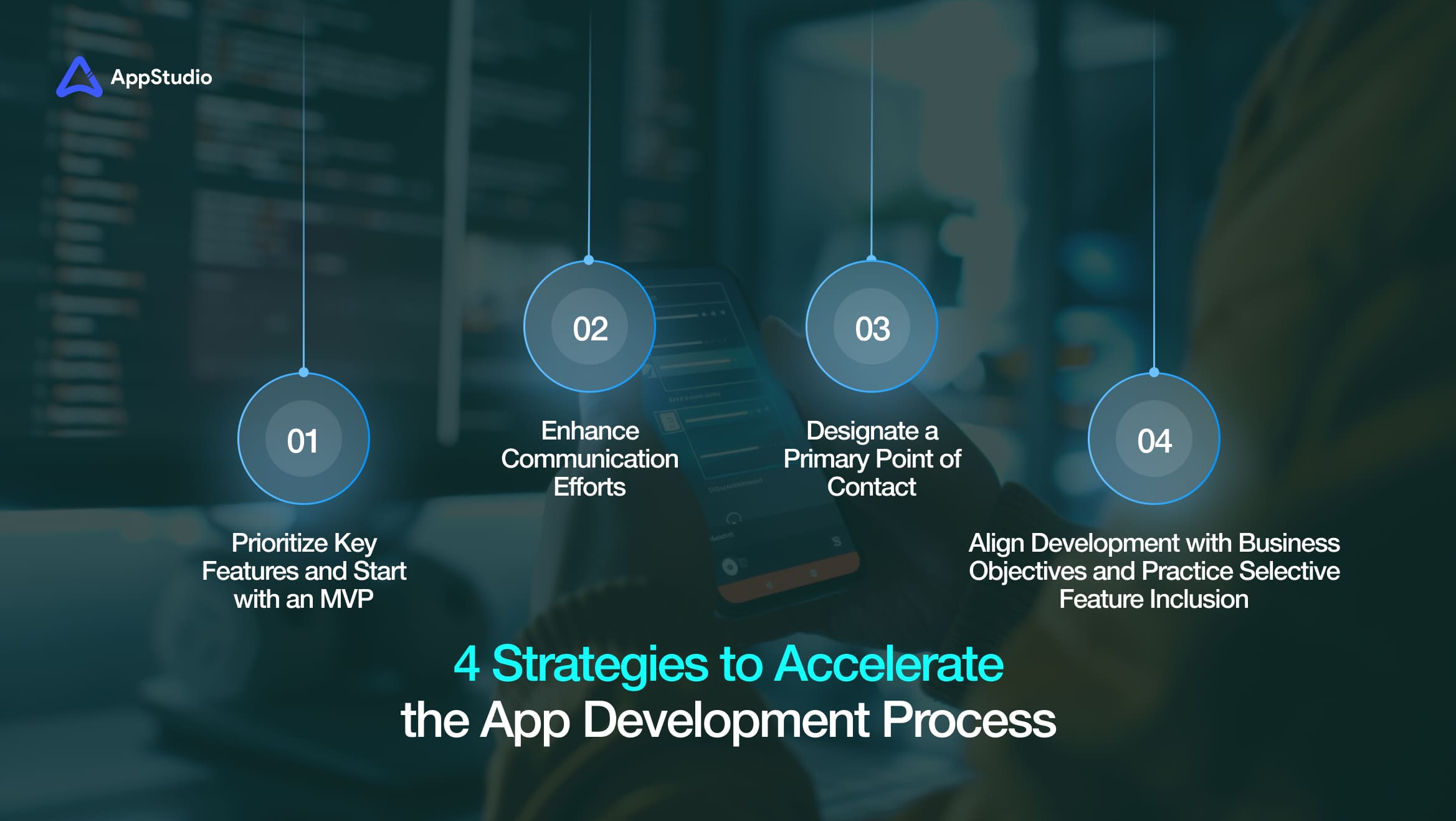
Building an app is an exciting venture, but often, there’s a pressing need to expedite the development stages. If you find the average development time for an app too extended, consider discussing these strategies with your development team to streamline the process.
Enhance Communication Efforts
Effective communication is crucial throughout the average mobile app development time. When working with an outsourcing partner, be prepared for a significant increase in communications, such as Slack messages and Zoom calls. Being proactive in these interactions by quickly responding and clearly articulating your decisions can considerably condense the average time for app development. Allocating about 10-20 hours per month for active project engagement has proven effective in our experience.
Prioritize Key Features and Start with an MVP
There are essentially two approaches to app creation: trying to include every possible feature from the start or focusing on launching with a set of core, high-quality features. We advocate for the latter approach—starting with a Minimum Viable Product (MVP). This method enhances the quality of the initial offerings and significantly reduces the average time for app development by focusing on essential functionalities first.
Designate a Primary Point of Contact
To streamline communications and avoid information overload during the average mobile app development time, it’s efficient to designate a single point of contact within the development team. Typically filled by a product manager or a solution architect, this role is responsible for updating you on project progress and any challenges, delays, or changes. Having one dedicated contact simplifies communications, reducing time wasted on misunderstandings and redundant conversations.
Align Development with Business Objectives and Practice Selective Feature Inclusion
Effective collaboration with stakeholders is crucial, and part of that involves understanding when to push back on certain ideas. At our company, we focus on task completion and achieving the client’s broader business goals. If the objective is to test the market quickly, we prioritize features and enhancements that align with this goal. Learning to say “no” to certain features can be crucial for keeping the project on track and avoiding needless expansions of the scope and average time it takes to develop an app.
By implementing these strategies, stakeholders can expect a more efficient development process, helping bring their app to market faster without compromising on quality or strategic alignment.
Related reading: Application Development: Tips & Tricks!
How AppStudio Can Enhance Your Mobile App Development Budget and Timeline
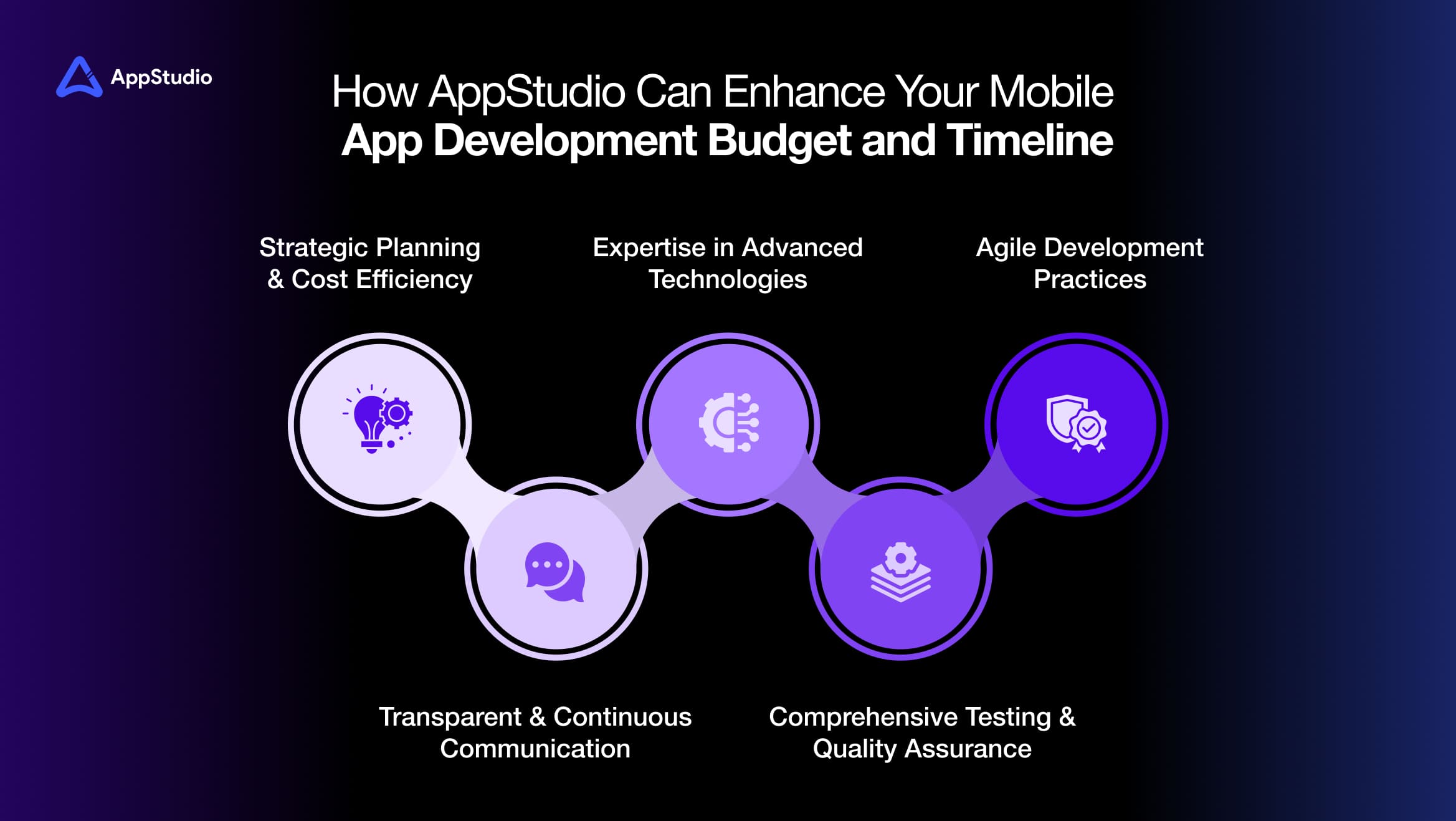
Navigating the complexities of mobile app development can be challenging, especially when balancing cost and time constraints. At AppStudio, we stand out as a resource for businesses like yours looking to efficiently address these challenges. With our solid history of optimizing budgets and timelines, we offer a suite of services tailored to streamline each stage of your app development.
Strategic Planning and Cost Efficiency
We start by carefully assessing your core business needs and the demands of the market, aiming to precisely define the scope of your project. This crucial step significantly impacts the average amount of time to develop an app and its related costs. By removing non-essential features and concentrating on key functionalities that provide genuine value, we ensure your investments align closely with your business objectives and user needs.
Expertise in Advanced Technologies
Utilizing cutting-edge technologies, we not only boost your app’s functionality and user experience but also enhance the efficiency of the development process. Whether incorporating advanced chatbots or deploying immersive AR/VR experiences, our modern technology skills can greatly reduce the average mobile app development time. This method accelerates the development process and diminishes long-term maintenance expenses.
Agile Development Practices
Our implementation of Agile methodologies means your project is managed in iterative cycles, facilitating continuous feedback and adjustments without significantly affecting the overall timeline or budget. This flexible process is instrumental in accurately estimating how much time is needed to develop an app while ensuring the final product aligns seamlessly with both user expectations and business objectives. Agile practices enhance resource management and can decrease costs linked to modifications and error corrections in later phases.
Transparent and Continuous Communication
A key feature of our approach at AppStudio is our commitment to clear and ongoing communication. By keeping you informed throughout the development process, we help minimize unforeseen costs and delays. This transparency ensures any modifications in project scope or new challenges are managed promptly, helping to keep the average time for app development on track.
Comprehensive Testing and Quality Assurance
Quality assurance is integral to each phase of development at AppStudio. By performing thorough testing throughout the project, our team ensures that any potential issues are identified and addressed early, preventing expensive corrections post-launch. This proactive stance on quality assurance aids in maintaining an efficient timeline and can further reduce the average amount of time to develop an app, protecting your investment.
Choosing AppStudio for your mobile app development optimizes both financial and time resources while enhancing the quality and efficacy of your final product. Our strategic planning, technological expertise, agile practices, and thorough quality assurance make us an ideal partner in your app development journey.
With us, you can anticipate a streamlined process that not only meets but exceeds your business and technical expectations, delivering a cost-effective and impactful product in your market. Whether you aim to lower costs, shorten development time, or elevate app quality, AppStudio offers the expertise and resources needed to achieve your objectives efficiently and effectively.
Frequently Asked Questions
The average development time for an app varies significantly based on its complexity and scope. Simple apps may take a few months, while more complex applications could require over a year of development.
Developing an app with advanced features like AR/VR, AI, or sophisticated data handling can significantly extend the development timeline, often requiring additional months of work to ensure functionality and stability. Understanding how much time it takes for app development with these complex technologies is crucial for setting realistic project timelines and expectations.
Several factors impact the average time to develop an app, including the app’s complexity, the technology used, the proficiency of the development team, and the integration of third-party services.
Yes, adopting Agile practices can streamline the development process, allowing quicker iterations and more efficient handling of changes, reducing the overall mobile app development time.
Using standard development practices without the incorporation of Agile methodologies, the average amount of time to develop an app can vary widely from 4 months to over a year, depending on the app’s requirements and complexities.
Strategic planning can significantly reduce uncertainties and rework, which often prolong the development process. The average app development time can be optimized by clearly defining the project scope, objectives, and milestones upfront, ensuring a smoother execution phase.
